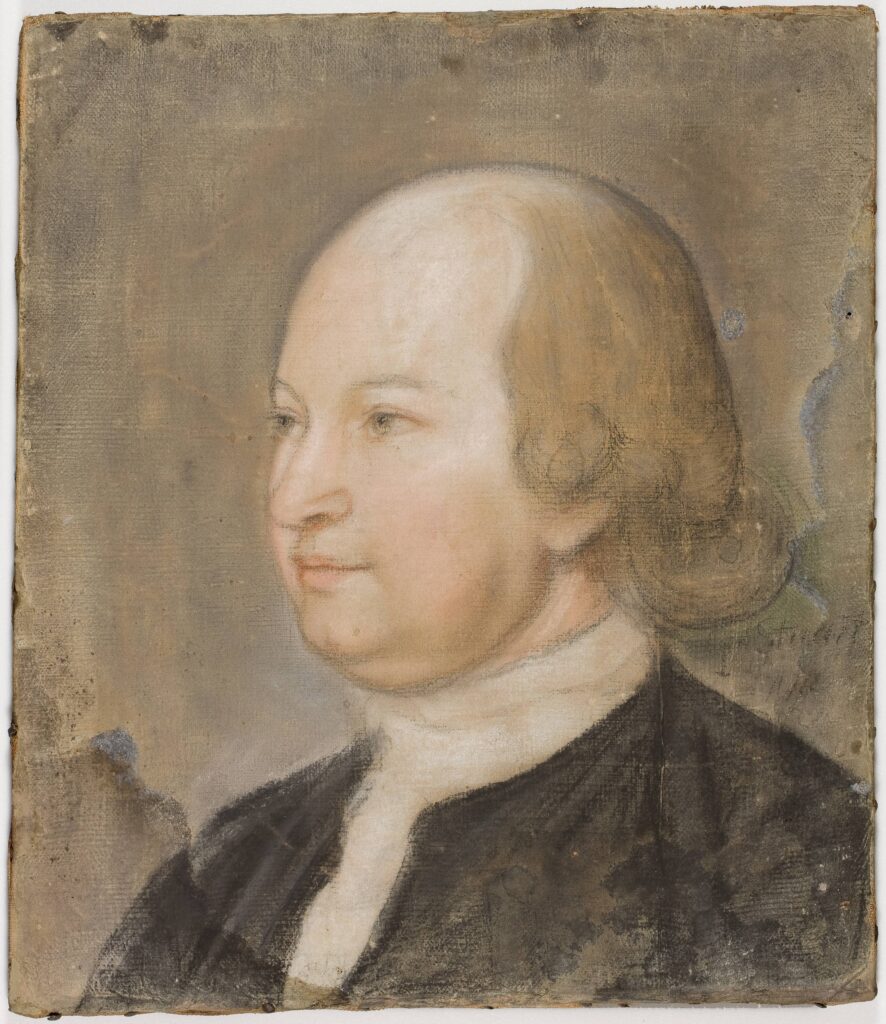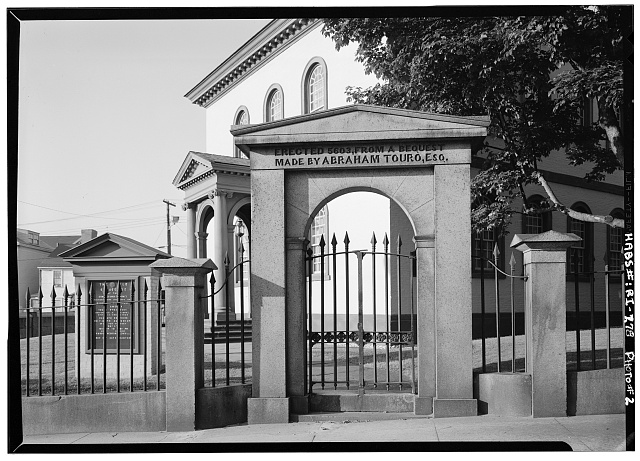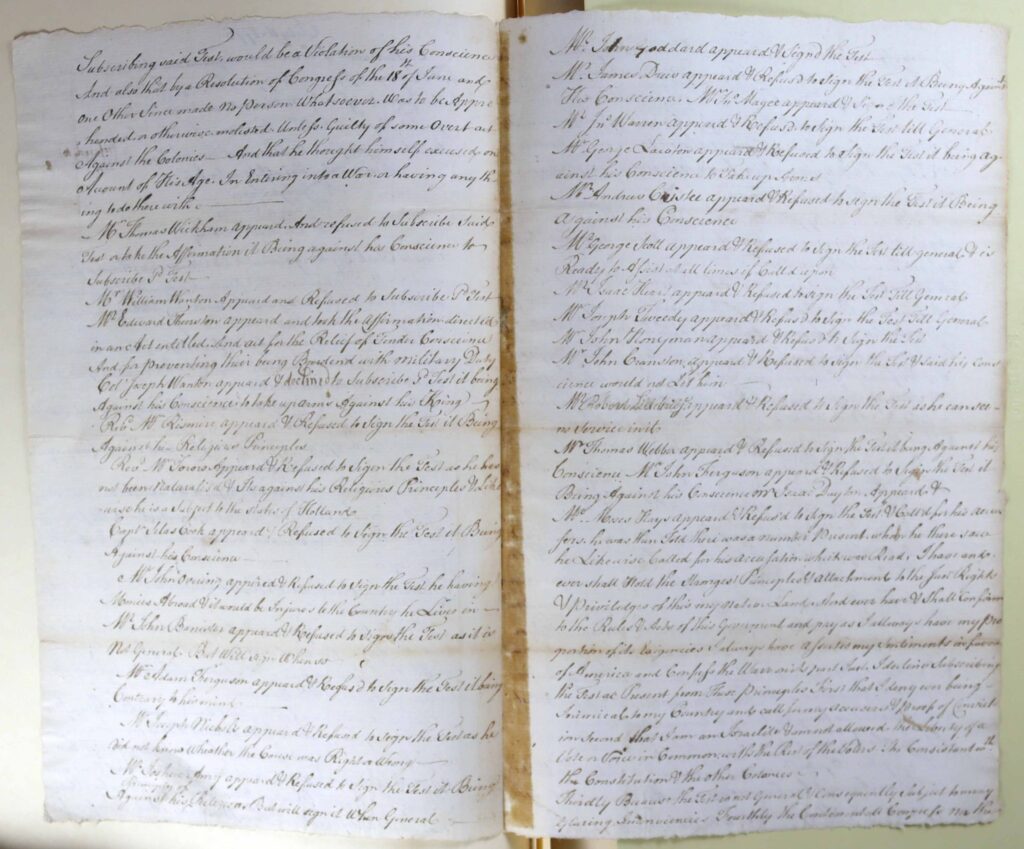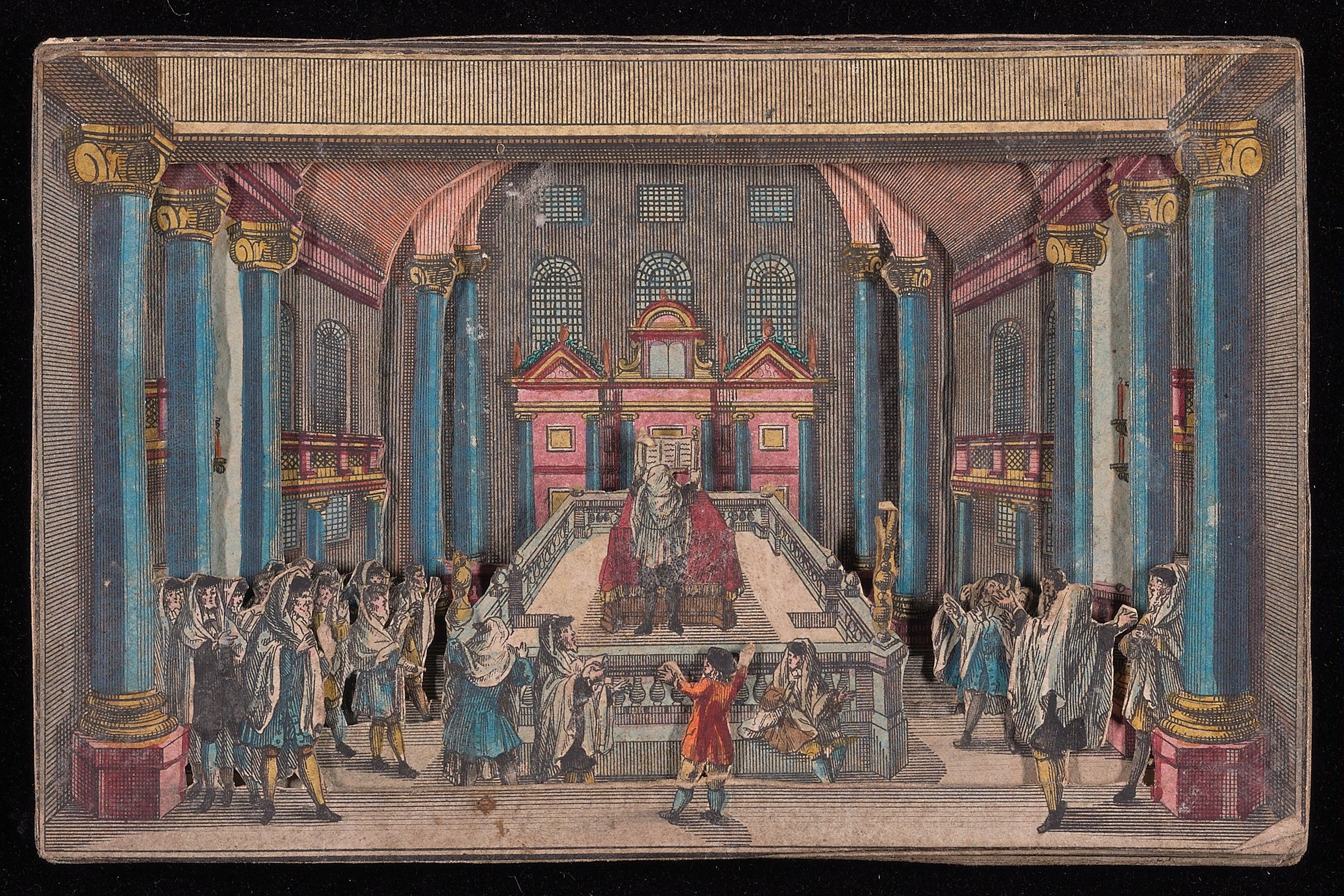Isaac Touro, Teacher and Leader
This image shows a multi-layered synagogue scene including the consecration of the synagogue and the reading of the Torah. The scene shows the Portuguese Synagogue in Amsterdam. Isaac Touro emigrated from Amsterdam to Newport, Rhode Island in 1759.
By Dr. Holly Snyder, Ph.D.

Isaac de Abraham Touro, then just 21 years old, arrived in Newport, Rhode Island, in the Fall of 1759. He was newly hired as a hazzan to take leadership of the town’s Jewish congregation. Isaac came from a family of religious scholars in Amsterdam and had been educated at one of that city’s best yeshivahs. His father, Abraham Touro, was a well regarded religious teacher. Although Isaac did not undergo ordination, he had a thorough Jewish education. At the time of his arrival in Newport, he read Hebrew fluently and was knowledgeable about scholarship on Jewish philosophy.
Isaac was selected for this newly-created job through an application process conducted by the synagogue of the Portuguese Jews of Amsterdam. At that time, no synagogue building yet existed in Rhode Island. Winning the position meant taking charge of the small Jewish community in Newport, a British colonial town that lacked everyday amenities available to residents of Amsterdam. After public testing of the capabilities of three finalists, Isaac Touro was chosen as the best match for the requirements set out by the Newport congregation in their letter to the Amsterdam synagogue. Isaac boarded a ship waiting at the wharf of merchant John Turner, and left Amsterdam for Newport.
Isaac’s experiences in Newport enlarged his life in ways he could not have imagined. Reared in a Godly religious atmosphere and largely separated from the non-Jewish world, by 1761 Touro had begun to form fast friendships within Newport’s Christian circles, including ordinary Newport mariners like Jeremiah Osborne as well as the ministers of the various Christian churches in the town. The ongoing construction of the synagogue brought attention to his otherwise understated role. Isaac embraced the opportunity to transform perceptions of Judaism and the small Jewish community he led by talking about Jewish practices to anyone who asked.

When the new synagogue was finally dedicated on the first night of Hanukkah in December of 1763, Isaac graciously entertained the curious Christian ladies and gentlemen who attended the festivities, and even gave a private tour to his friend Rev. Ezra Stiles, minister of Newport’s Second Congregational Church. By the late 1760s, Isaac was providing Hebrew lessons to Stiles, with whom he met on a regular basis. Isaac enjoyed the company of other Godly men, and sought them out whenever he could. In 1769, Isaac engaged Rev. Stiles in the discussion of various aspects of Hebrew forms of worship and rabbinical interpretation. He hosted visiting rabbis and Jewish scholars, whom he introduced to his interested Christian contacts. He even participated in social events with Newport’s Christian clergy, with whom he engaged in intellectual conversations. On a breezy September afternoon during the late 1760s, he was said to have shared a rum punch with the town’s two Baptist ministers, a Congregational parson and the Rector of Trinity Church at the house of Capt. Stephen Wanton on the occasion of a visit from a popular Quaker preacher. All of the clergymen who attended this party, including Touro, were said to have had a bit too much punch, which made them tipsy and “as loving as puppies” with one another.
Isaac remained single for his first 14 years in Newport, working diligently to establish himself. He finally married in June 1773, at age 35. For his bride, he chose the daughter of a Dutch Jewish merchant from New York. Soon after the marriage, Touro entertained Christian friends at home. In November 1773, he invited Rev. Stiles to dinner, the first time that Stiles had ever dined in a Jewish home. As a man of deep spiritual gifts, Isaac treasured these opportunities for scholarly interchange with other men of God, both Christian and Jewish. He nurtured connections among those with a theological bent, and offered his home as a space where these conversations could take place. Isaac was equally devoted to his role as hazzan of the Newport synagogue, and attended diligently to the requirements of Jewish ritual practice as well as the spiritual needs of the community. This often included tasks such as decorating the synagogue for holidays, or preparing it for special events like the sermon delivered there by Haim Isaac Karigal, a visiting rabbi, in June of 1773.

As talk of war emerged in the 1770s, Isaac chose not to participate in political discussions, and he refused to take sides in popular disputes. Prior to the Revolutionary War, Newport’s Jewish congregation was divided between Patriots and Loyalists. As their leader, Isaac maintained a public stance of neutrality. This made him suspicious to proponents of the Revolution. On July 11, 1776, he was called before the Rhode Island General Assembly for examination along with other persons whose loyalties were questionable. Like other clergy, Touro declined to take the test oath for the American cause, stating that political oaths were against his religious principles. He also pointed out that he was a subject of Holland, and had never sought naturalization from Great Britain. Nevertheless, the war brought him only hardship. Three years of British occupation impoverished Newport, and Touro was pressed to move his young family elsewhere. He evacuated to New York with the British. Without a way to make a living there, he moved his family again. He died in Jamaica in 1784, just after the war ended. Newport’s synagogue was given the Touro name after Isaac’s children gave money for its preservation in the 1800s.
Terms:
Hazzan: A Hebrew term for a lay person who leads prayer services by reading or chanting Jewish prayers in the synagogue. The person who performs this task in the modern synagogue is called a Cantor.
Yeshivah: A school where the study of Judaism and Jewish religious practice is taught. During the 1700s, only boys and young men would have had access to this kind of Jewish education.
Ordination: The official ceremony by which a student of the religion becomes capable of leading religious services and acting as religious guide to a community of believers. This process is typically used in both Judaism and Christianity.
Hanukkah: Often called the Festival of Lights, Hanukkah is a holiday that marks the liberation and rededication of the Temple in Jerusalem at a time of war and oppression in ancient times. As such, it is seen as a celebration of freedom and the right to practice Judaism.
Resources:
Dexter, Franklin B. (ed.), The Literary Diary of Ezra Stiles, D.D., LL.D., President of Yale College (New York: Charles Scribner’s Sons, 1901), 2 Volumes
Emmanuel, I. S., “Notes on the Jews of North America as Found in Divers Manuscripts and Archives in Holland and in Curacao,” pp. 1-4, typescript in the American Jewish Archives, Cincinnati, OH.
Leibman, Laura Arnold, Messianism, Secrecy and Mysticism: A New Interpretation of Early American Jewish Life (London and Portland, OR: Vallentine Mitchell, 2012)
Marcus, Jacob Rader, American Jewry – Documents – Eighteenth Century (Cincinnati: American Jewish Archives, 1959), pp. 17-18, 281-282.
Mason, George Champlin (comp.), Re-Union of the Sons and Daughters of Newport, R.I., August 23, 1859 (Newport: Fred A. Pratt & Co. 1859), pp. 121-130.
Sarna, Jonathan D., American Judaism: A History (New Haven: Yale University Press, 2004)
Next to Moses Lopez, Manufacturer

